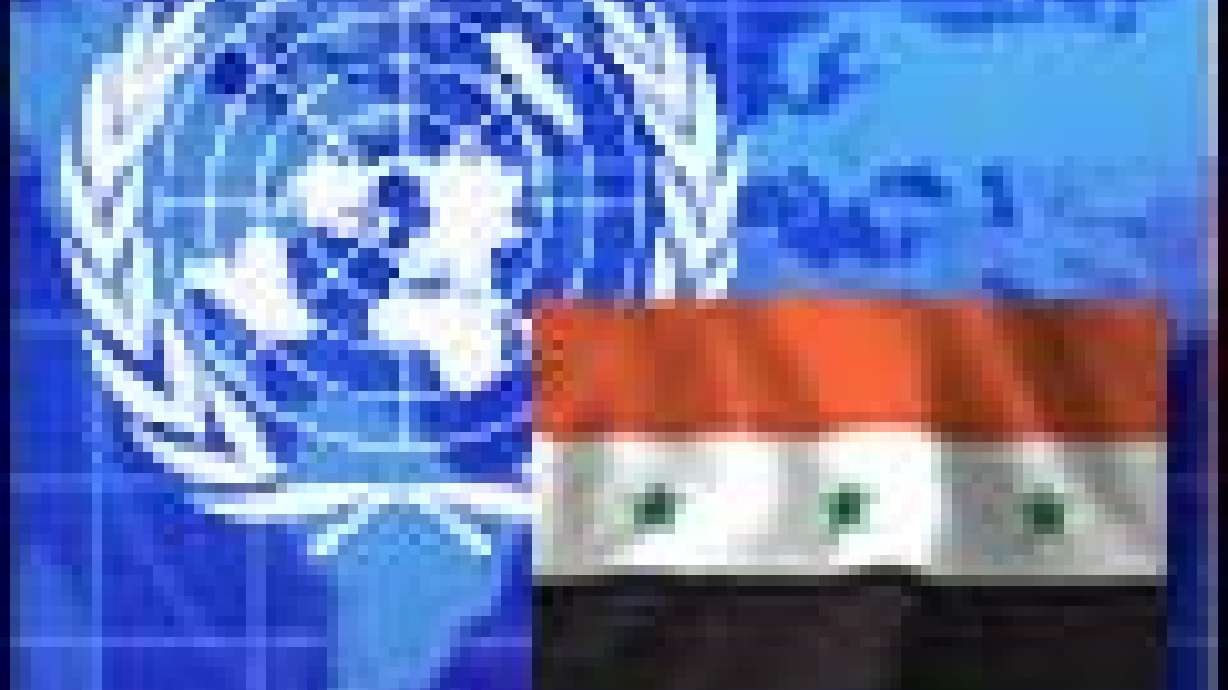Estimated read time: 4-5 minutes
This archived news story is available only for your personal, non-commercial use. Information in the story may be outdated or superseded by additional information. Reading or replaying the story in its archived form does not constitute a republication of the story.
WASHINGTON (AP) The time for United Nations debate is down to hours, the likelihood of war against Iraq growing, after a one-day summit at which President Bush and three allied leaders bluntly demanded that Iraq be disarmed swiftly and completely.
Still defiant, Iraqi President Saddam Hussein threatened a wider war if attacked.
"We hope tomorrow the U.N. will do its job," Bush said Sunday at a news conference in the Azores Islands in the Atlantic where he and the leaders of Britain, Spain and Portugal met.
"Tomorrow is a moment of truth for the world," he added. First thing Monday, several top administration officials filed into the White House. The group included Defense Secretary Donald H. Rumsfeld, Attorney General John Ashcroft, Homeland Security Secretary Tom Ridge and FBI Director Robert Mueller.
Also by Monday, Mohamed ElBaradi, head of the International Atomic Energy Agency, announced that the Bush administration had advised the agency to start pulling its inspectors out of Iraq.
Administration officials said the opportunity for diplomacy would end Monday, whether the U.N. Security Council -- deadlocked for weeks -- approved or rejected a plan calling on Iraq to disarm, or even if the resolution were withdrawn.
The Security Council scheduled closed consultations at 10 a.m. EST Monday and arranged a mid-afternoon meeting at U.N. headquarters in New York. But there was little or no evidence that France, Germany or Russia had dropped opposition to a resolution that threatened Saddam with war if he didn't immediately rid his regime of weapons of mass destruction.
France also called for an emergency U.N. ministerial session on Tuesday to set a timeline for Iraq's peaceful disarmament and reiterated its threat to exercise its veto in the Security Council.
"France cannot accept the resolution that sets an ultimatum and envisages an automatic use of force," Foreign Minister Dominique de Villepin said Monday on a French radio station.
Bush, British Prime Minister Tony Blair and their summit partners met Sunday at a U.S. air base in the Azores as the American-led military buildup in the Persian Gulf continued. More than 250,000 troops, a naval armada and an estimated 1,000 combat aircraft are in the region, ready to strike if and when the president gives the word.
One administration official, speaking on condition of anonymity, said Bush planned to address the nation, possibly as early as Monday evening.
French President Jacques Chirac said Sunday he was willing to accept a 30-day deadline for Iraq to disarm, provided the move was endorsed by U.N. weapons inspectors. "We just feel that there is another option, another way, a more normal war, a less dramatic way than war," he said in an interview on CBS "60 Minutes."
Vice President Dick Cheney brushed aside Chirac's proposal, listing a series of French actions in recent years he said had let Saddam avoid disarmament.
At his news conference in the Azores, Bush also was scornful of France's role in the diplomatic struggle over Iraq.
Noting he had called earlier this month for Security Council members to take a stand, he said: "France showed their cards.
After I said what I said, they said they were going to veto anything that held Saddam to account."
Blair, flying home from the summit Sunday evening, told reporters that diplomats would work through the night to try and find common ground.
"People have got to decide whether they are going to allow any ... resolution to have teeth, to make it clear that there is a real ultimatum in it, and that's what we need to find out overnight," he said. "You cannot have a resolution which simply stipulates further discussion."
In Baghdad, Saddam was unbowed. "When the enemy starts a large-scale battle, he must realize that the battle between us will be open wherever there is sky, land and water in the entire world," he told his military commanders in remarks carried by the official Iraqi news agency.
Saddam also denied his nation possesses chemical weapons, as alleged.
There were unambiguous signs that war could occur within a short period of time.
The State Department on Sunday night ordered nonessential personnel and all family members to leave Israel, Kuwait and Syria in a precautionary move. The departure order updates an advisory last month that authorized those people to leave voluntarily.
Bush said war could be averted if Saddam were to leave the country. There was no indication that would happen, however.
At their summit, Bush, Blair, Spanish Prime Minister Jose Maria Aznar and Portuguese Prime Minister Jose Manuel Durao Barroso issued a formal statement that said "any military presence, should it be necessary, will be temporary ... Our commitment to support the people of Iraq will be for a long time."
(Copyright 2003 by The Associated Press. All Rights Reserved.)









